

While Africa-friendly China’s economic growth languishes at 25-year lows, Standard Bank joint CEO Sim Tshabalala has deviated from popular economic opinion which cautions of a devastating knock-on effect of the slowdown on African economies, arguing instead that the Asian powerhouse’s transition from an investment-led to a consumption-based growth model could rather spell good news for the continent in the longer term.
While acceding that short-term prospects painted a bleak picture, with the value of Africa-China trade down by as much as 25% year-on-year in 2015, he reminded delegates at the Frontier Advisory Deloitte Africa Outlook forum, in Johannesburg, that this followed 15 years in which trade between the parties had grown by over 2 000%, from around $5-billion in 2000 to about $220-billion in 2014.
“Many Chinese firms are now deeply invested in Africa, and increasingly look to this continent for growth opportunities that are getting harder to find at home.
Tshabalala further pointed to the possible upsides of a weaker yuan for African countries that remained heavily reliant on Chinese manufactured goods and services.
Countries such as Ethiopia, Kenya and Mozambique had posted trade deficits in recent years, owing to high import volumes of Chinese capital goods. “A weaker yuan will mean more heavy equipment and more infrastructure at a lower cost,” he asserted.
Moreover, China’s emerging consumption-based growth model could add 4.7%, or $181-billion, to Africa’s gross domestic product (GDP) by 2030, compared with China’s current growth path, with Kenya, Botswana and Nigeria the biggest winners, and only Zambia likely to experience a small net loss. “Gloom about the effects of China’s slowdown on Africa can be overdone,” he reiterated.
Therefore, if South Africa can avoid another period of frequent load-shedding or major strikes, depreciation has relatively low costs to the economy as a whole, gives exporters a boost, and may create opportunities to undertake longer-lasting reforms to our labour and product markets – it is always easier to operate on a relatively healthy patient,” remarked Tshabalala.
While presenting an optimistic appraisal of Africa’s long-term prospects, Tshabalala retained the view that the continent was unlikely to realise much economic improvement this year, describing it as “running out of policy space” for further monetary or fiscal expansion.
Domestically, Tshabalala noted that pundits would be looking to Finance Minister Pravin Gordhan’s February National Budget speech for firm evidence of fiscal discipline and a commitment to rebuilding the country’s competitiveness.





